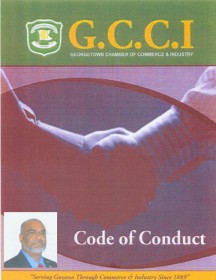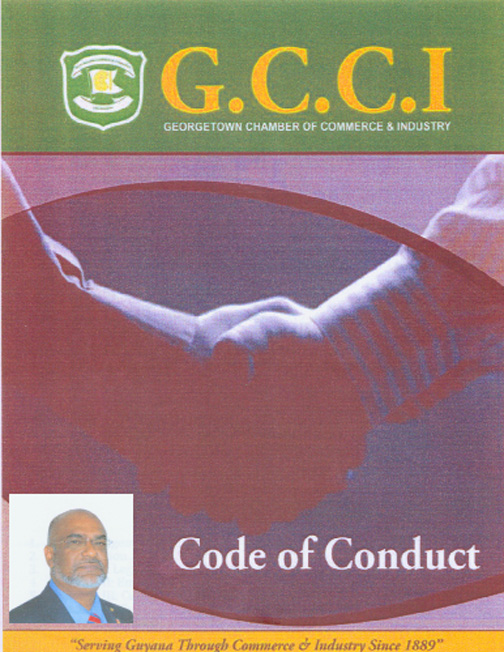– competitive advantage must be earned, not paid for
Higher standards of ethical behaviour underpinned by respect for national laws and regulations governing trading practices, improved levels of customer service, a commitment to fair business transactions and the “professional and diligent management” of business enterprises are among the key features of the Code of Conduct promulgated by the George-town Chamber of Commerce and Industry (GCCI) on Tuesday evening.

The Code of Conduct which the GCCI says is intended to serve as a “guideline” for its members “on firm business ethics” symbolizes what the chamber says is its “commitment to conduct our business in accordance with all the applicable laws, policies and regulations and the highest ethical standards.” And while members of the local business community have said that the Code of Conduct is a step in the right direction they point out that once it is intended to serve as a “guideline” rather than a requirement, there could be difficulty with implementation. “Rules are really only good if you can implement them and if you have ways of enforcing them,” a businessman and chamber member told this newspaper last Wednesday.
Following his election to office earlier this year GCCI President Kamal Ramnauth had told Stabroek Business that he was placing high priority on the promulgation of the Code of Conduct. In response to concerns raised by this newspaper about likely difficulties in enforcing a Code of Conduct, Ramnauth had said that voluntary compliance with the code was what the chamber was aiming for.
Among the key clauses in the GCCI’s Code of Con-duct are those governing “corrupt behaviour and bri-bery by means of exchange of cash, gifts or information” as well as attempts to gain commercial advantage by offering inducements to government officials or public servants. For several years the private sector has raised muted complaints about the bottlenecks in the various departments of the Guyana Revenue Authority (GRA) which have given rise to a culture of bribery and corruption. Prior to the implementation of its Code of Conduct the GCCI had spent months in discussion with the GRA on a range of issues including rendering the procedures associated with the clearing of goods arriving at ports less tedious.
Local businessmen have told Stabroek Business that the GCCI Code of Conduct as it pertains to offering bribes of GRA officials and other public servants can only be effective if the procedures that apply at the GRA and other state agencies are rendered more customer-friendly.
The new Code of Con-duct also pronounces on several key employee rights, which commit chamber members to, among other things, ensuring “a respectful, non-discriminatory, safe and harassment-free workplace,” competitive emoluments for their performance based on merit, employment practices and policies comply with labour laws and with good industrial relations practices.
Prominent in the provisions of the 111-year-old GCCI’S Code of Conduct are provisions governing customer service including clauses that commit chamber members to “treat[ing] all customers fairly in all aspects transactions,” providing “appropriate remedies for addressing customer dissatisfaction and uphold[ing] the provisions of national legislation for addressing customer complaints.”
Some businessmen accept that if the chamber is to persuade its members to adhere to the provisions in the new code governing customer service, significant investments will have to be made in training staff to provide service that meets customers’ expectations. Over the years business houses in the commercial sector have paid only limited attention to training staff. “Some of us are not even sure if good customer service plays a role in attracting business,” one trader told us.
The new Code of Con-duct also seeks to ensure that members of the chamber strive to “secure a fair and competitive return on investment while protecting the interests of shareholders”. Additionally, the code speaks to the need to create a business environment in which consideration is given to all requests, suggestions, complaints and formal resolutions made by investors and shareholders. The code also commits the chamber’s members to engage in fair trade and competition within the realms of the law and to evince respect “for both trademark and intellectual property rights.”
The clause governing respect for trademark and intellectual property rights is likely to be one of the first ones to be tested given the ongoing public protests among booksellers and publishers’ representatives over the illegal re-printing of published text books and their sale of the local market by some prominent businesses.
Meanwhile, the GCCI code also addresses business practice in the context of the environment, urging the members “strive to minimize any damage to the environment” while reducing the “health impact of our operations through responsible use of natural resources and conservation practices and the reduction of waste and emissions.” Clauses in the Code of Conduct governing the environment are likely to attract the attention of the mining sector which, in recent months, has become embroiled in controversy with government over new, restrictive mining laws which, the authorities say, seek to protect the environment.
The new Code of Conduct was developed by the GCCI over the past two years by past and current members of the organization and Ramnauth says that it seeks to serve as a reminder of the need to be “responsible for maintaining the highest ethical standards” in business transactions.

